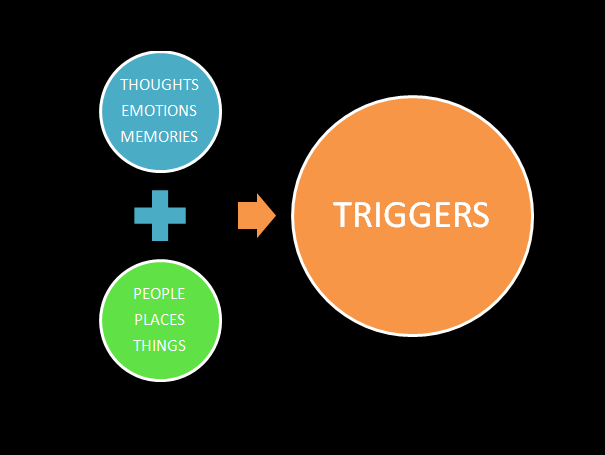A trigger is something that causes (an event or situation) to happen or exist. While recovering from addiction, a trigger is some sort of internal or external stimulus that causes the former addict to desire to use drugs or alcohol again.
Internal triggers include thoughts, emotions and memories. Examples are: stress, mental or physical illness, being hungry, angry, lonely, tired (HALT), social isolation, negative and /or challenging emotions, boredom, overconfidence in recovery or any other feeling.
External triggers include people, places, things. Examples are: seeing the object of your addiction, times of celebrations or social situations, new jobs and/or promotions, romantic relationships, a location of previous using behavior.
Triggers are common in recovery, especially in early recovery and having a plan ahead of time will make you less likely to react to the trigger. It is important to be honest with yourself and recognize, as well as, identify your triggers. Make a list of triggers and develop a plan should you encounter one in the future. The list can be added to, as you recognize internal and/ or external triggers along the way.
Life presents challenges. One can never avoid triggers completely, however how you respond to them will make a difference in whether or not these nuances will tempt you to resort to your old habits. Remember, it takes a thought to generate an action, therefore try to stop at the thought to control the action.
Healthy ways to deal with triggers should one be encountered:
• Be present in the moment and notice where you are
• Replace negative thoughts with gratitude or positive thoughts
• Journal
• Go for a walk
• Call your sponsor or other sober support
• Meditate
• Rehearse positive affirmations
• Listen to uplifting music
• Recognize your feeling is temporary, don’t obsess or act out impulsively
• Get out and help another addict/alcoholic
• Walk away from uncomfortable situations
Take the time to take care of yourself. While practicing healthy habits is good for everyone, people in recovery can especially benefit from being mindful in taking care of themselves. When one is engaged in addiction, healthy habits get pushed aside and as a result overall health suffers. Additionally, engaging in a healthy lifestyle helps to prevent triggers.
Healthy ways to prevent triggers include:
• Exercise
• Rest
• Therapy or counseling
• Meditation or mindfulness
• Spend time with positive people
• Drink water or tea for relaxation/hydration
• Join a support group
• Eat nutritional meals
• Use positive distractions
• Re-frame negative attitudes or perceptions
It is important to remind yourself that you have put in a lot of work to get where you are in your recovery. It should be upfront in importance to protect that recovery and not let anything or anyone jeopardize it. You and you alone are responsible to yourself and your sobriety. You owe it to yourself and your future to take any steps necessary to protect what you have accomplished. Life is hard and situations come up that are difficult. With practice, you will learn how not to face obstacles head on without the need to avoid them with substance use. Keep a positive attitude and be patient the rewards of sobriety are many!
~Teri Storm

